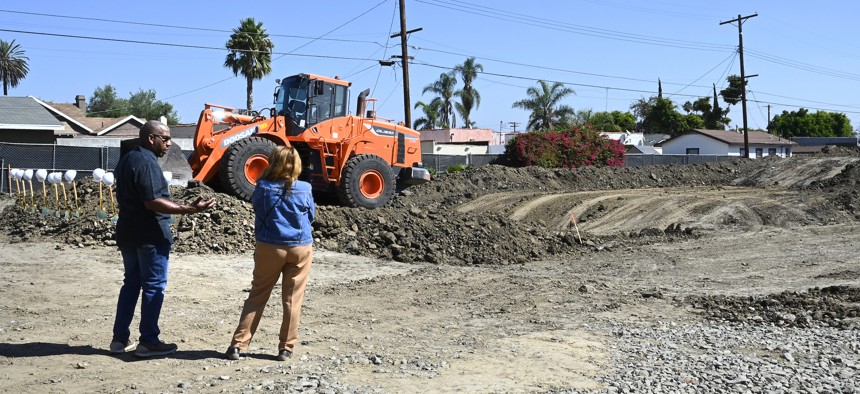Connecting state and local government leaders
Cities and states are addressing zoning and funding challenges to help faith-based organizations transition underutilized property into affordable housing.
Faith organizations own thousands of acres of land nationwide. The Church of Jesus Christ of Latter-day Saints is the fifth-largest landowner in the country. The United States Conference of Catholic Bishops owns property in nearly every county in the U.S. But these properties are increasingly standing vacant as service attendance declines and congregations relocate. Meanwhile, the homeless crisis continues to worsen, leaving cities and states looking for new affordable housing options.
Those conditions have, in part, inspired a new law in Minnesota that allows faith-based organizations to build shelters for homeless individuals on their property. Minnesota is just the latest example of governments turning to faith-based institutions for housing solutions.
Take Atlanta, for example. The city is one of the fastest growing in the country, but affordable housing developments have not kept pace. When Mayor Andre Dickens took office in 2021, he set a goal of creating 20,000 affordable housing units over eight years. Under his plan, 2,000—or 10%—of those units would be developed by churches, synagogues, temples and other religious institutions.
To meet that goal, the city launched the Faith-based Development Initiative to offer technical assistance to faith organizations interested in making affordable housing available on their properties.
The city works with organizations to learn about the barriers that make housing development difficult—everything from zoning and funding challenges to accessing experts—and looks for ways to mitigate those challenges.
“We want to work with whoever is willing,” said Wesley Myrick, senior policy analyst for the city’s Housing Innovation Lab.
Faith institutions own hundreds of acres of land in and around Atlanta, according to Myrick. So far, 40 institutions plan to participate in the initiative, and about a dozen are already positioned to get going in the next year or two, he said. The city also serves as a networking hub, connecting faith leaders with architects, planners and other subject matter experts.
Over the last year and a half, the city has hosted 17 workshops covering everything from legal considerations around housing developments to financing different stages of projects and generating revenue.
The city will also soon launch a forgivable loan program that will offer $25,000 for pre-development efforts, Myrick added.
Besides access to land, faith organizations bring a lot to the table when it comes to creating affordable housing, Myrick said. Congregations are embedded in communities, already known and trusted by residents. Plus, most religions have a philanthropic-centered culture.
“It’s a value-aligned endeavor,” he said. “Congregations and faith-based institutions want to take care of people.”
Atlanta is far from the first city to help faith-based institutions develop affordable housing. A recent study surveyed 33 congregations that led affordable housing projects between 2010 and 2022. It found that the average development included 78 units and most frequently served low-income families, seniors, people with disabilities and those who had previously experienced homelessness. Almost all projects had or planned to offer on-site support services for residents.
Nearly two-thirds of survey participants reported that navigating city zoning regulations—and either getting them changed or waived—was one of the largest barriers in the planning phase.
“That’s where these projects end up dying—at the city council level,” said lead researcher Catherine Fisher in a recent webinar.
Balancing good intentions with government processes isn’t always easy. In Minnesota, for example, a new law will require municipalities to allow faith organizations to build shelters on their land for extremely low-income or chronically homeless people.
But the new legislation raises concerns around preemption of local land use and planning laws, said Daniel Lightfoot, intergovernmental relations representative for the Minnesota League of Cities. The statute requires all communities to allow these housing developments, regardless of the size of the community and the resources available, he said.
The law lays out a range of specific building codes the institutions must meet before moving forward with their developments, including electrical and framing requirements. These codes are different from those used for traditional housing, which raises concerns about health and safety, Lightfoot said.
The faith organizations must also provide their respective municipalities with their plans for the development, including how the community will dispose of sewage from the units. The statute requires that residents have access to showers and kitchens in the church, synagogue, temple or other nearby faith building. But in a state where winter temperatures can drop to well below zero, it's a system that can be dangerous for residents, he said.
“If a religious institution meets the requirements in statute, they can do it,” he said. “There's nothing that a city can do to say, ‘Hey, we're not really prepared to support this novel use in our city, we have a very small police force, small EMS, etc.’”
Though most faith institutions are in areas zoned for single family housing, the new law doesn’t offer existing residents the opportunity to provide input the way they typically would at zoning and planning meetings, Lightfoot said.
The statute also requires that one-third to 40% of residents in the tiny homes be volunteers from the community. It’s an effort to build a sense of community, advocates said, as people experiencing homelessness often don’t have the social connections housed people do. However, those volunteers aren’t required to have any kind of training or provide wraparound services for people experiencing homelessness, according to Lightfoot.
The law goes into effect Jan. 1, and it will take some time to see how the legislation pans out and what challenges arise. While the League of Minnesota Cities has concerns, Lightfoot said he appreciates the innovative approach to the housing crisis.
“We all have a shared goal of addressing homelessness in Minnesota,” Lighfoot said.”We have over 20,000 homeless individuals on any given day that are unsheltered in Minnesota, and we’re working diligently to provide solutions and adequate resources to address housing instability and homelessness.”

NEXT STORY: Indiana, other states increasingly restricting foreign land buys




